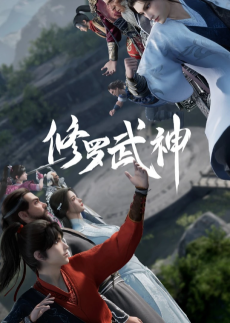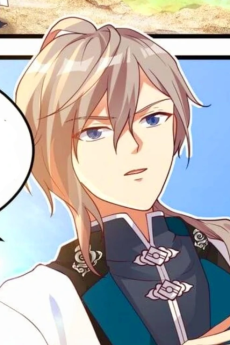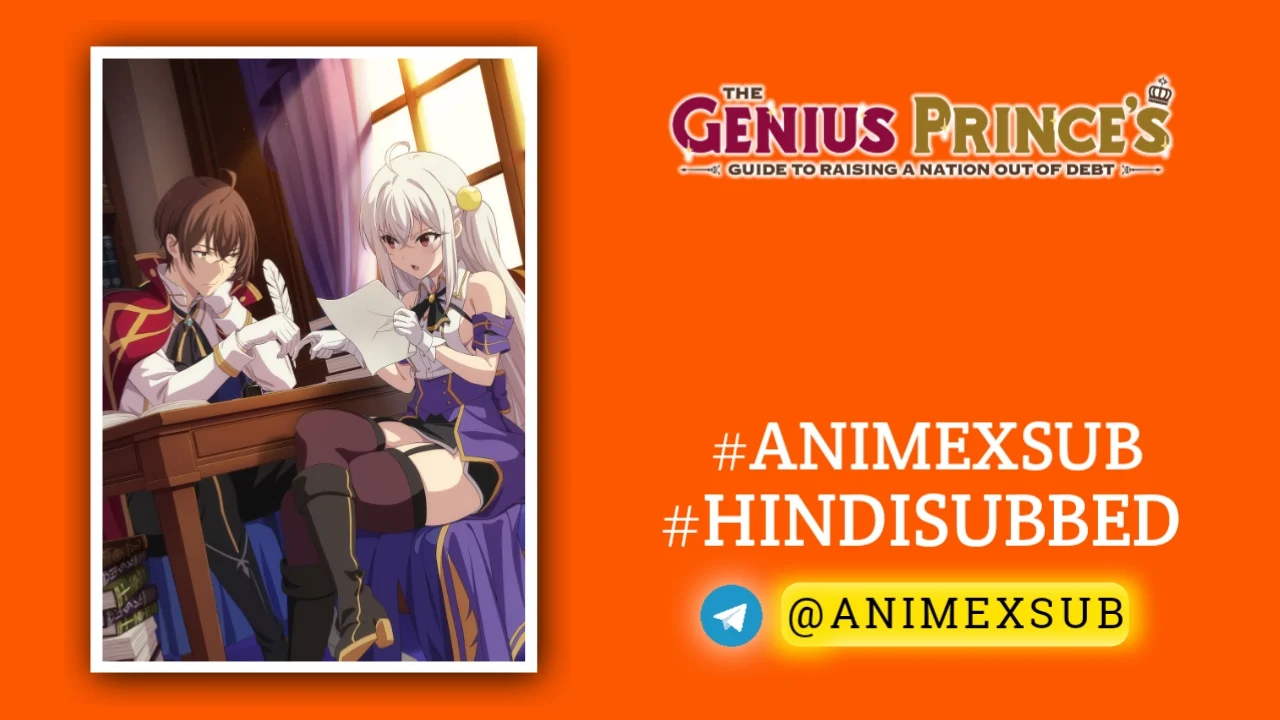
Martial God Asura Season 1 Hindi Subbed [16/16] | Xiuluo Wushen Hindi Sub

Xiuluo Wu Shen
Synopsis
One night a mysterious and unexplained phenomenon occurs in the nine provinces. Five years later Chu Feng, a regular outer disciple of the Azure Dragon school, awakens one of the mysterious nine lightning beasts. And discovers an egg sealed inside him.
Watch Trailer
Characters
Episodes
Martial God Asura Season 1: A Raw, Relentless Dive into Cultivation Chaos
Martial God Asura (Xiuluo Wushen), the 2023 donghua adaptation of Kindhearted Bee’s sprawling Chinese web novel, bursts onto the screen with a ferocity that mirrors its hot-blooded protagonist, Chu Feng. Season 1, spanning 16 episodes, covers roughly the first 262 chapters of the novel, delivering a high-octane introduction to a cultivation saga that thrives on relentless pacing, morally complex characters, and a world where power dictates survival. This review dissects the season’s strengths, flaws, and unique elements, offering a fresh perspective on its place in the crowded cultivation genre, without any promotional fluff.
Plot and World-Building: A Brutal Climb to Power
Season 1 follows Chu Feng, an outer disciple of the Azure Dragon School, who awakens a mysterious lightning beast and discovers a sealed egg within his body, setting him on a path of explosive growth. The story kicks off with a mysterious phenomenon in the Nine Provinces, but the focus quickly narrows to Chu Feng’s journey from a disrespected underdog to a force of nature. The narrative is a whirlwind of sect politics, brutal tournaments, and personal vendettas, with Chu Feng’s pursuit of strength driving every episode.
The world-building is both a strength and a sticking point. The Nine Provinces Continent feels alive with its layered cultivation system—realms and ranks that dictate social hierarchy—and the show introduces concepts like Mysterious Techniques and World Spirits with enough clarity to hook newcomers. However, the adaptation condenses the novel’s dense lore, sometimes glossing over details like the significance of Chu Feng’s bloodline or the broader cosmology. Unlike Battle Through the Heavens, which balances world-building with character moments, Martial God Asura leans heavily into action, occasionally at the cost of deeper context. Still, the sheer scale of its universe—hinting at realms beyond the continent—sets up an intriguing foundation for future seasons.
Chu Feng: A Flawed, Compelling Anti-Hero
Chu Feng is the heart of the show, and his characterization is a double-edged sword. He’s not your typical noble hero; he’s arrogant, vengeful, and unapologetically ruthless, embodying the “Asura” of the title. His hot-blooded nature fuels thrilling moments, like when he defies sect elders or obliterates opponents who underestimate him. Yet, his moral ambiguity—particularly in scenes involving extreme violence or questionable actions toward female characters—can alienate viewers. For example, a controversial plot point involving a lust-inducing drug and Su Rou deviates from the novel’s darker implications, but still feels jarring in its execution.
Compared to protagonists like Yun Che from Against the Gods, Chu Feng lacks the nuanced redemption arc that might justify his actions. Instead, the show paints him as a product of his brutal world, where mercy is a luxury. This raw edge makes him compelling but divisive; you’ll either root for his defiance or cringe at his recklessness. His growth, tied to the lightning beast and egg, adds intrigue, as these elements hint at a destiny far grander than the sect squabbles of Season 1.
Animation and Action: Visceral but Inconsistent
Produced by Tencent Animation, the donghua’s visuals are a mixed bag. The fight scenes are a highlight, with fluid choreography and vibrant depictions of martial techniques. Moments like Chu Feng’s use of the Divine Lightning or his battles against fierce beasts crackle with energy, rivaling the intensity of Soul Land or Swallowed Star. The color palette, dominated by fiery reds and electric blues, amplifies the show’s aggressive tone.
However, the animation quality dips in quieter scenes, with stiff character models and repetitive backgrounds. The character designs are functional but lack the distinct flair of top-tier donghua like Perfect World. Sound design fares better, with a pulsing soundtrack that elevates key battles, though the voice acting (in the Chinese dub) can feel overly dramatic, even for a genre known for theatrics.
Pacing and Adaptation Choices: A Double-Edged Sword
The donghua’s pacing is relentless, covering 262 novel chapters in just 16 episodes, each around 20 minutes. This breakneck speed keeps the adrenaline pumping but sacrifices depth. Key moments, like Chu Feng’s inner disciple exam, are streamlined—40 fierce beasts in the novel become a handful in the anime, diluting the stakes. The rushed cultivation progression also makes Chu Feng’s power-ups feel convenient at times, though the novel’s fans argue this mirrors its unapologetic power fantasy.
The adaptation takes liberties that spark debate. For instance, a pivotal fight in Episode 16 alters a shocking novel moment (Chu Feng’s attempted self-harm) to something less extreme, likely to soften its impact for broader audiences. While these changes make the show more accessible, they risk alienating fans of the novel’s raw intensity. Compared to Apotheosis, which hews closer to its source, Martial God Asura prioritizes spectacle over fidelity, for better or worse.
Themes and Moral Complexity: A Mirror to a Harsh World
What sets Season 1 apart is its unflinching portrayal of a dog-eat-dog world. The show doesn’t shy away from the cultivation genre’s darker themes—power corrupts, and survival demands ruthlessness. Chu Feng’s actions, while extreme, reflect a society where strength is the only currency. This moral grayness, coupled with the Asura motif, gives the series a unique edge over more heroic narratives like Douluo Dalu. Yet, the lack of introspection or consequences for Chu Feng’s darker deeds can feel hollow, especially for viewers seeking character growth beyond power levels.
Reception and Community Buzz
Fan reactions, as seen on platforms like Reddit and MyAnimeList, are polarized. Some praise the donghua for its addictive pacing and Chu Feng’s badass moments, likening it to Solo Leveling for its unapologetic power fantasy. Others criticize its repetitive arcs and moral issues, with some dropping it for echoing the novel’s flaws too closely. The 16-episode run, released in a batch on September 26, 2023, left fans clamoring for a second season, though no confirmation has surfaced as of September 2025.
Verdict: A Flawed but Addictive Power Trip
Martial God Asura Season 1 is a raw, unfiltered plunge into the cultivation genre’s extremes. Its strengths—explosive action, a vivid world, and a polarizing protagonist—make it a standout for fans of high-stakes power fantasies. But its rushed pacing, inconsistent animation, and moral ambiguity won’t click with everyone. It’s not Battle Through the Heavens’ polished epic or Soul Land’s balanced storytelling, but it carves its own niche with sheer audacity.
For those who crave a protagonist who thrives in chaos and a world where power reigns supreme, Season 1 delivers a visceral thrill. If you prefer nuanced characters or tighter narratives, you might find it overwhelming. Either way, it’s a bold adaptation that captures the novel’s unapologetic spirit, flaws and all. Here’s hoping a potential Season 2 slows down to let its world and characters breathe.
Sources: MyAnimeList, Reddit discussions, Martial God Asura Wikia






